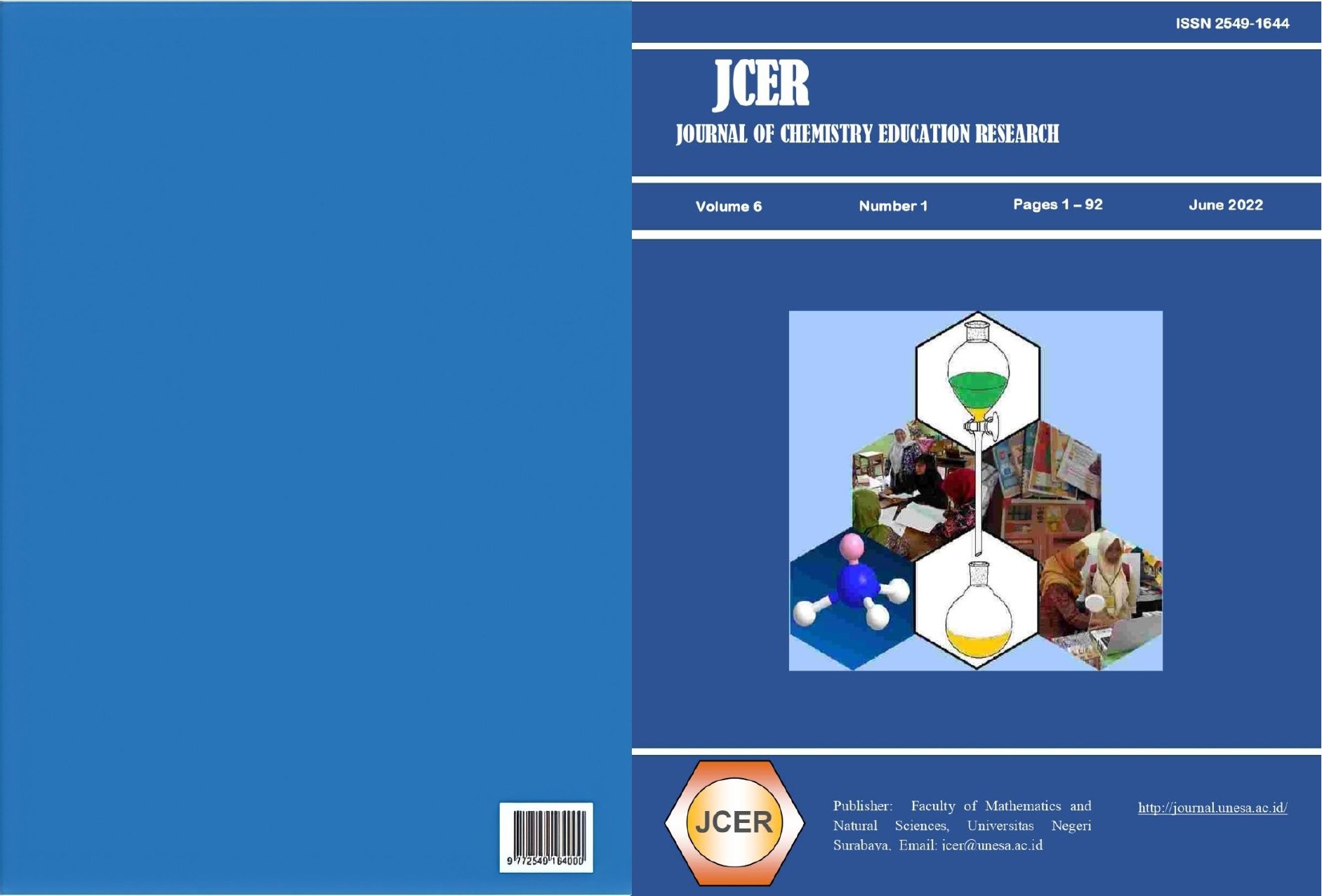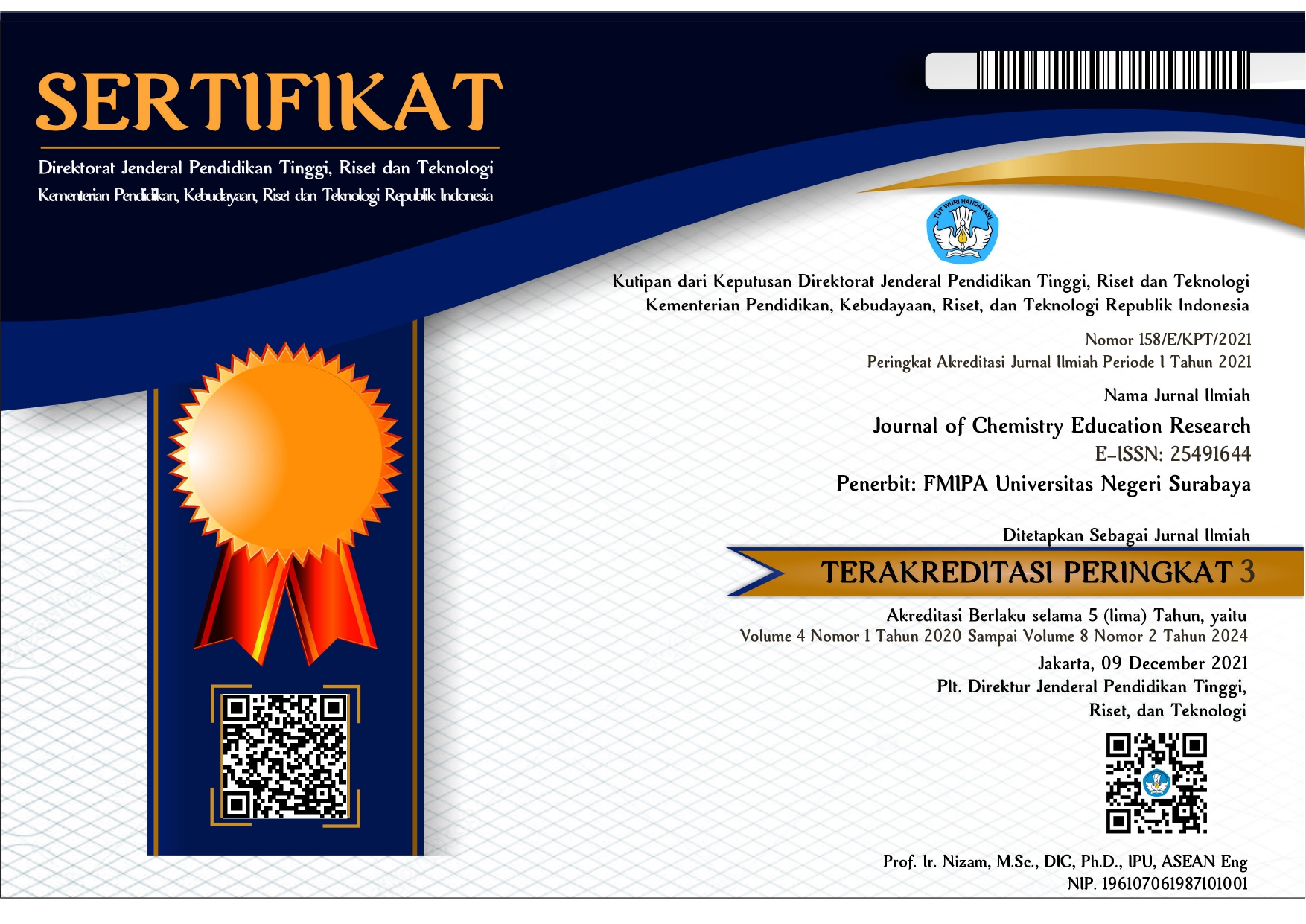CHEMY SHOOTER GAME BASED COMPUTER AS INSTRUCTIONAL MEDIA ON ACID BASE FOR IMPROVE SELF-EFFICACY
DOI:
https://doi.org/10.26740/jcer.v6n1.p84-92Keywords:
Chemy shooter game, self-efficacy, acid baseAbstract
This study aims to obtain the game as an acid-based learning media that can improve the self-efficacy skills of students of high school studentsusing the Chemy Shooter game as a learning media on acid-base materials with research and development (R&D) methods.The validation assessment results obtained 90,79% had fulfilled the validity category. The results of questionnaire responses and observations of students activities gained 96,16% and 93,33% with the category of very practical. Student learning outcomes significant values in the Kolmogorov-Smirnov normality test obtained a pretest value of 0,200 and posttest 0,200 so that it is greater than 0,05 so that it is normally distributed and Paired Sample t-Test test obtained significant pretest and posttest 0,000 significant values are less than 0,05 so that there are differences in the average pretest and posttest scores and the results of students self-efficacy skills gained 89,20% in the very effective category.References
Syah, M. 2013. Psikologi Pendidikan Dengan Pendekatan Baru. Bandung: PT Remaja Rosdakarya.
Permendikbut. 2018. Peraturan Menteri Pendidikan dan Kebudayaan Republik Indonesia Nomor 20 Tahun 2003 Tentang Sistem Pendidikan Nasional. Jakarta: Menteri Pendidikan dan Kebudayaan Repubik Indonesia.
Mulyasa. 2006. Menjadi Guru Profesional: Menciptakan Pembelajaran Kreatif dan Menyenangkan. Bandung: Rosdakarya dalam Anggraeni, 2016.
Sanjaya, W. 2008. Perencanaan & Desain Sistem Pembelajaran. Jakarta: Prenadamedia Group.
Hamalik, Oemar. 1994. Media Pendidikan. Bandung: PT Citra Aditya Bakti.
Lutfi, Achmad., Suyono, & Nur, Mohamad. 2014. Penilaian Permainan Bersarana Komputer sebagai Media Pembelajaran Ilmu Pengetahuan Alam, Proseding Seminar Nasional Kimia,ISBN: 978-602-0951-00-3.
Nasution. 2012. Teknologi Pendidikan. Jakarta: Bumi Aksara.
Darmawan, D. 2012. Teknologi Pembelajaran. Bandung: Remaja Rosdakarya.
Azhar, A. 2014. Media Pembelajaran. Jakarta: Raja Grafindo Persada.
Sadiman, A. S., dkk. 2012. Media Pendidikan: pengertian, pengembangan dan pemanfaatanya. Depok: Rajawali Press.
Buckley, Patrick., & Doyle, Elaine. 2016. Gamification and student motivation. Interactive Learning Environments. Vol. 24, No. 6, 11621175.
Hinton, Lauren., Glenn, Simpson., &Smith, Denecia. 2008. Increasing Self-efficacy Beliefs in Middle School Students Using Quantum Learning Techniques. Educational Specialist Candidates Piedmont College (online) (http://www.quantumlearning.com/wpcontent/uploads/2012/05/SelfEfficacy.pdf diakses pada 22 juli 2012) Sugiyono. 2016. Metode Penelitian Kuantitatif, Kualitatif dan R&D. Bandung: PT Alfabet.
Sugiyono. 2016. Metode Penelitian Kuantitatif, Kualitatif dan R&D. Bandung: PT Alfabet.
Frazer, A., Saucedo, A, R., Gilbert, L., Wills, G. 2013. Profiling the Educational Value of Computer Games. Interaction Design and Architecture(s) Journal. Vol.19, pp. 9-27, 2013.
Ningrum, R. I., & Lutfi, A. 2019. Permainan House Of ChemistrySebagai Media Pembelajaran Pada Materi Hidrokarbon Kelas XI SMA. Unesa Journal of Chemical Education Vol. 8, No. 2, pp.43-49.
Rastegarpour, Hassan., &Marashi, Poopak. 2012. The Effect of Card Games and Computer Games on Learning of Chemistry Concepts. Procedia-Social and Behavioral Sciences. 31. 597-601.
Rahmawati, Annisa., & Lutfi, Achmad. 2018. The Development Of Super Chem Game Oriented Android As Instructional Media Electrolyte And Non Electrolyte. Journal of Chemistry Education Research. Vol. 2, No. 1, ISSN: 2549-1644.
Lutfi, Achmad.2013. Memotivasi Siswa Belajar Sains Dengan Menerapkan Media Pembelajaran Komik Bilingual. Jurnal Pendidikan danPembelajaran, Terakreditasi Ditjen Dikti, 20 No. 2 (Okt 2013), Universitas Negeri Malang: 152-159.
Nursalim, Mochamad., dkk. 2007. Psikologi Pendidikan. Surabaya: Unesa University Press.
Yunitasari, P. F., & Agustini, R. 2013. Pengembangan Media Permainan 7 Icon Chemistry Pada Materi Pokok Ikatan Kimia Untuk Meningkatkan Hasil Belajar Peserta didik Kelas X SMA. Unesa Journal of Chemical Education. Vol. 01. No. 03. 98-102.
Pravita, E.A.E., & Lutfi, A. 2019. Pengembangan Permainan Strat Adventure Berbasis Komputer Sebagai Media Pembelajaran Struktur Atom Untuk Siswa SMA. Unesa Journal of Chemical Education Vol. 8 No. 1, pp.101-108.
Arum, K.N.R., & Lutfi, A. 2012. Memotivasi Siswa Belajar Materi Asam Basa Melalui Media Permainan Ranking One Chemistry Quiz. Unesa Journal of Chemical Education Vol. 1, No. 1, pp 174-179.
Nieveen, N., & Plomp, T. 2013. An Introduction to Education Design Research. Netherlands: SLO.
Downloads
Published
Issue
Section
License
Copyright (c) 2022 JCER (Journal of Chemistry Education Research)

This work is licensed under a Creative Commons Attribution-NonCommercial 4.0 International License.
 Abstract views: 255
,
Abstract views: 255
, PDF Downloads: 286
PDF Downloads: 286



